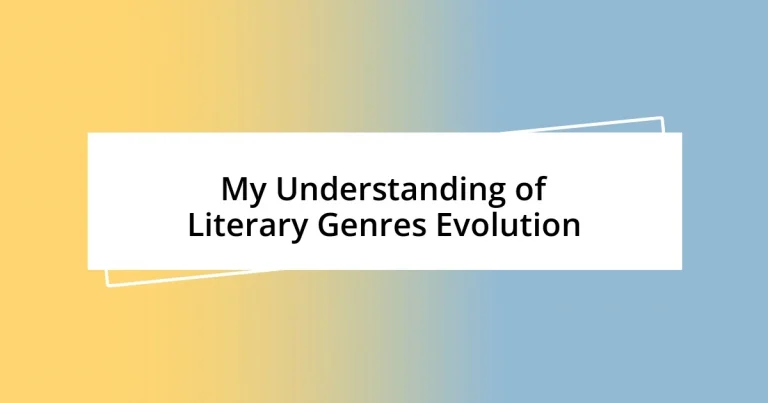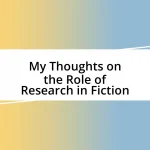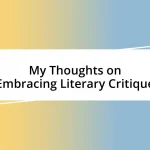Key takeaways:
- Literary genres have evolved significantly through history, reflecting societal changes and cultural contexts, from epic poetry in the Classical Period to the diverse genres of the 20th century.
- Key factors influencing genre changes include societal context, technological advancements, and cultural exchange, each shaping how stories are told and received.
- Contemporary trends show a blending of genres and formats, along with increased representation of marginalized voices and themes such as eco-fiction, indicating a dynamic future for literature.
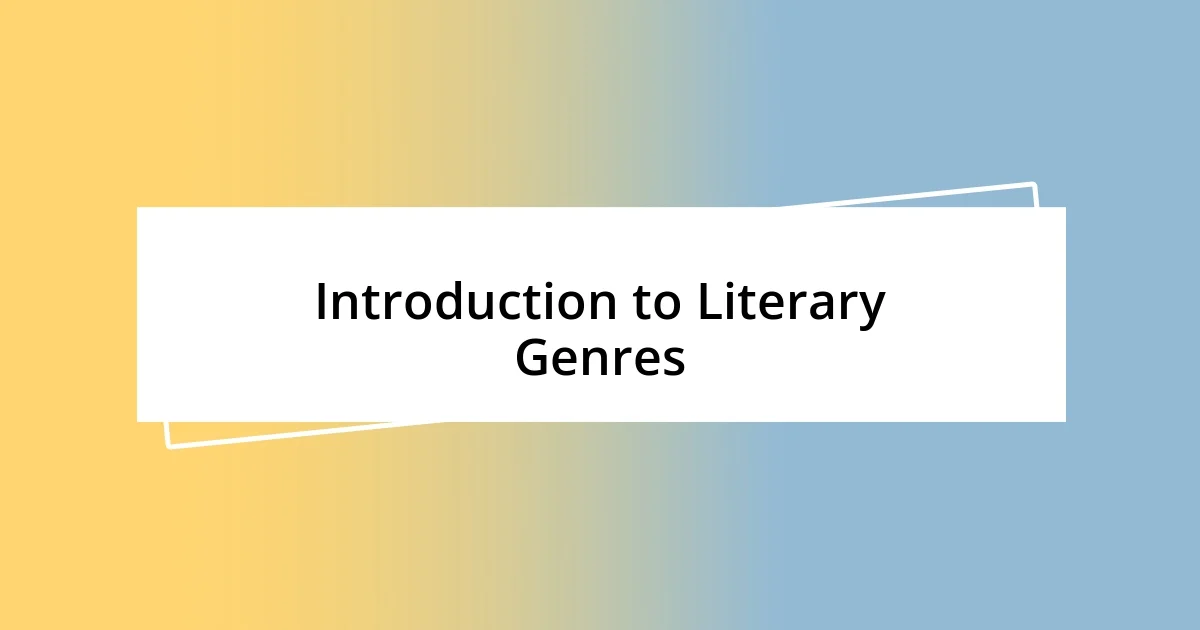
Introduction to Literary Genres
Literary genres are the frameworks through which we experience stories. I often find myself lost in the pages of a thriller, feeling the tension in my chest, as if the danger were real. Isn’t it fascinating how genres shape our emotions, pulling us into different worlds and perspectives?
As I reflect on my reading journey, I realize that each genre serves a unique purpose. For instance, the warmth of a heartfelt romance or the suspense of a gripping mystery can stir profound emotions. Can you recall a moment when a particular genre made you feel something unforgettable? It’s those moments that reveal the power of storytelling.
Additionally, genres aren’t static; they’ve evolved dramatically over time, influenced by cultural shifts and societal changes. Think about how dystopian fiction has surged in popularity alongside real-world challenges. I can’t help but wonder how future generations will interpret our current genres. What do you think will remain timeless in literature?
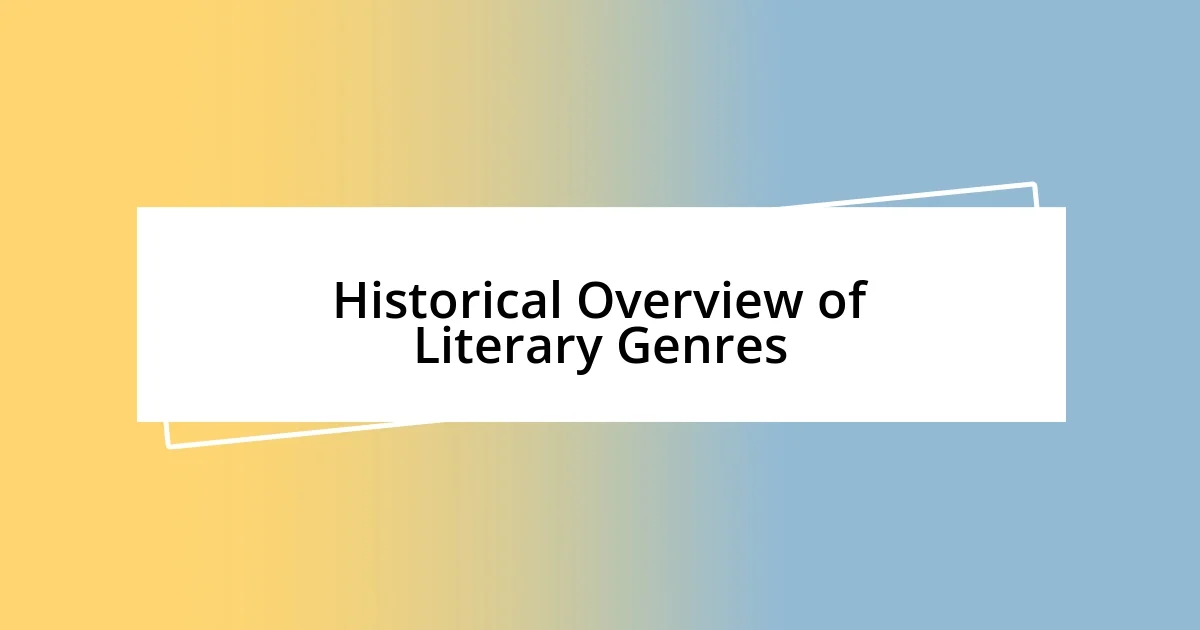
Historical Overview of Literary Genres
The journey of literary genres has been a fascinating one, reflecting the complexities of human experience throughout history. I remember studying the epic poems of ancient civilizations, like those of Homer, where heroes navigated quests filled with monumental themes of honor and morality. It’s intriguing how these early forms of narrative laid the groundwork for what would evolve into more defined genres.
- Classical Period (circa 800 BC – 500 AD): Emergence of epic poetry and drama, focusing on heroism and tragedy.
- Middle Ages (circa 500 – 1500): Rise of chivalric romances and religious texts, highlighting moral and spiritual themes.
- Renaissance (14th – 17th centuries): A flourishing of genres including sonnets and early novels, mirroring humanism and exploration.
- Enlightenment (17th – 19th centuries): The novel took prominence, with a shift towards realism and individualism.
- 19th century: Birth of various subgenres such as gothic fiction and detective stories, reflecting societal anxieties.
- 20th century onward: Dramatic diversification with genres like science fiction, fantasy, and postmodernism, often intermingling elements from multiple genres.
Reflecting on these periods, I’m constantly amazed at how each genre encapsulates the era’s ethos and social currents. For example, when I immersed myself in the works of the Brontë sisters, it struck me just how their novels intersected with the themes of gender and class struggles of their time. It’s this connection between genre and history that ignites my passion for exploring literature.
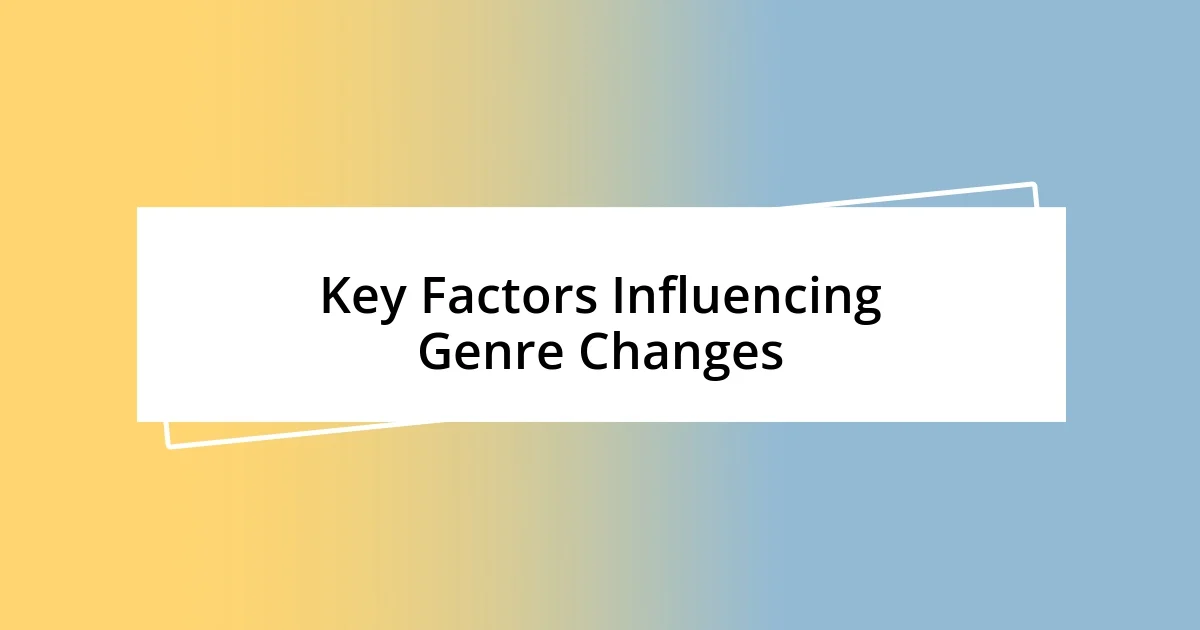
Key Factors Influencing Genre Changes
As I delve into the factors influencing genre changes, one stands out prominently: societal context. When I think about the rise of feminist literature in the late 20th century, it’s clear how women’s rights movements shaped not just the narratives but the very genres themselves. It was as if every page echoed the desires and struggles of a generation seeking to find its voice. Isn’t it fascinating to consider how a social shift can catalyze an evolution in literary expression?
Technological advancements play a significant role as well. The advent of the internet, for instance, has birthed new genres like blog literature and web fiction. I remember first discovering serialized stories online; it felt like opening a treasure chest of creativity. Each story was like a conversation between the author and the reader, breaking traditional molds. This democratization of storytelling has allowed voices from diverse backgrounds to flourish, continuously reshaping the landscape of genres.
Cultural exchange is another key factor in the evolution of genres. I often reflect on how global narratives have interwoven together—take magical realism, which beautifully combines elements of Latin American storytelling with broader literary traditions. It reminds me of my experience reading Gabriel García Márquez, where reality and fantasy coalesce seamlessly, creating a unique genre experience. How do you think the blending of cultures will lead to the emergence of new genres in the future?
| Factor | Description |
|---|---|
| Societal Context | Shifts in societal norms influence the themes and narratives within genres, as seen with feminist literature. |
| Technological Advancements | The rise of digital platforms introduces new formats and genres, allowing diverse narratives to emerge. |
| Cultural Exchange | Interactions between different cultures foster hybrid genres, combining various storytelling traditions. |
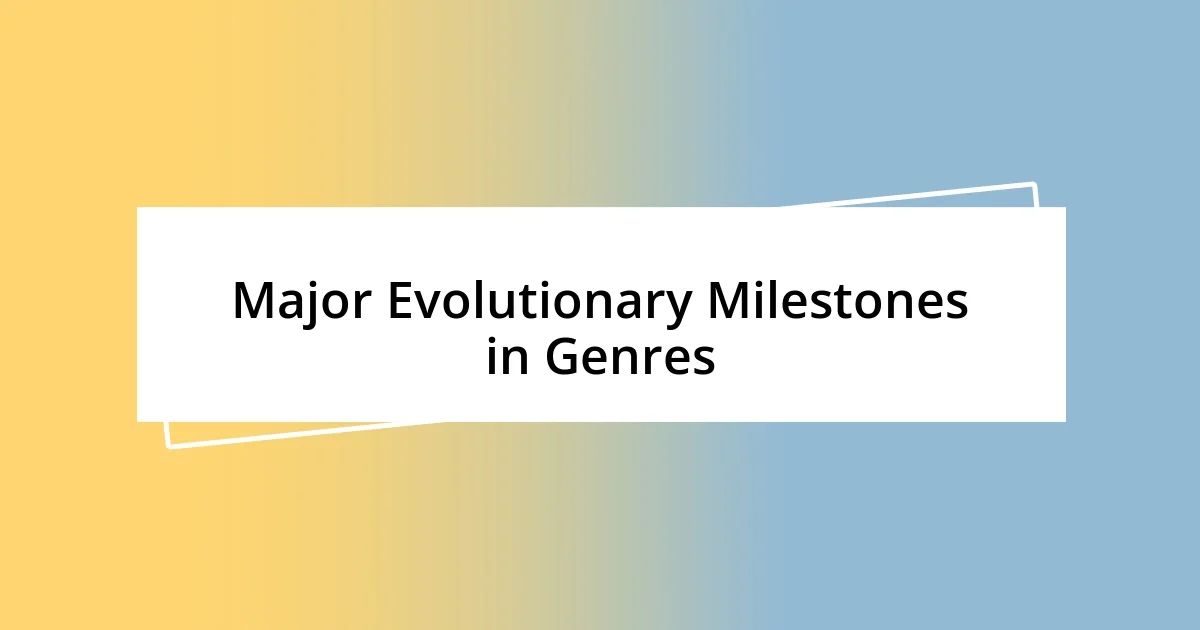
Major Evolutionary Milestones in Genres
The evolution of literary genres has been punctuated by key milestones that redefine how we experience storytelling. For instance, when I first encountered the rise of the novel during the Enlightenment, it felt revolutionary. Here was a form that prioritizes personal experience over collective myth, allowing authors like Jane Austen to explore the intricacies of human relationships in ways that felt deeply relatable. How did this shift influence how we connect with characters today?
Moving into the 19th century, the emergence of gothic fiction really struck a chord with me. The brooding atmosphere and psychological depth of novels like “Jane Eyre” not only engaged our fears but also explored the darker aspects of the human psyche. I remember reading it late at night, feeling that shiver of suspense blend seamlessly with my own emotions. How does the exploration of fear and morality in these genres resonate with us even now, I wonder?
In contrast, the explosion of diverse genres in the 20th century, such as science fiction and postmodernism, marked a vibrant period of experimentation. I still recall my first encounter with Philip K. Dick’s “Do Androids Dream of Electric Sheep?” It captivated me with its philosophical questions about reality and identity. It’s fascinating how these genres don’t just entertain us; they challenge our perceptions and expand our understanding of what a narrative can achieve. It begs the question: how much further can we push the boundaries of genre now that we’re embracing hybrid forms?
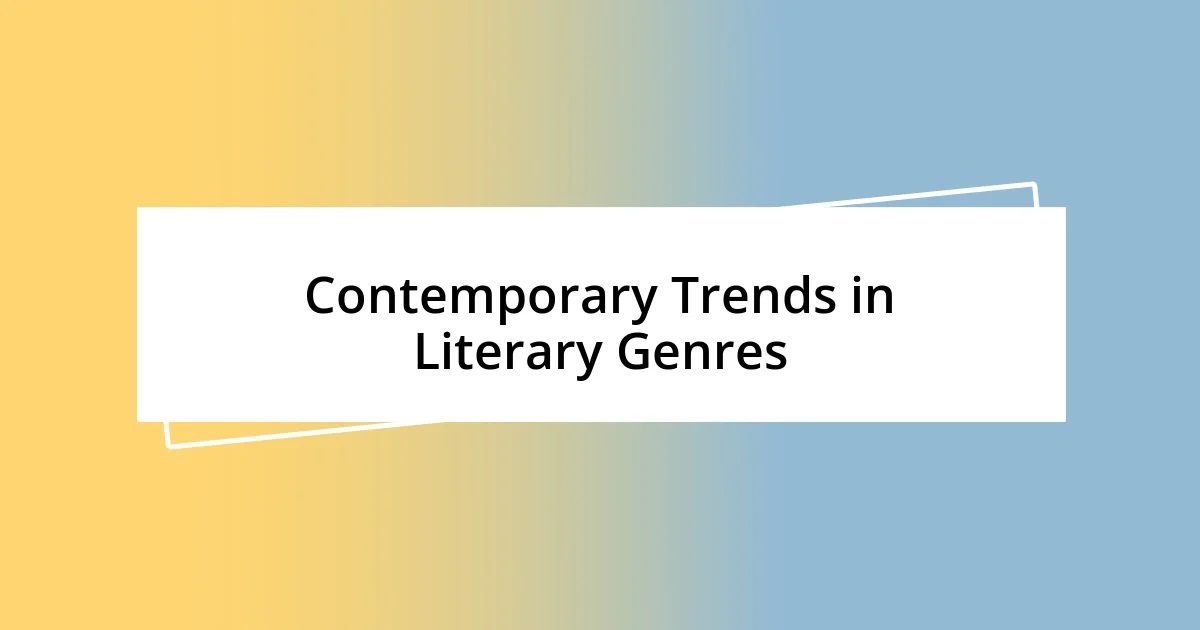
Contemporary Trends in Literary Genres
I’ve noticed that contemporary literature is increasingly blurring the lines between genres, which adds a layer of richness to our reading experience. For example, I recently picked up a book that seamlessly combines elements of fantasy and historical fiction. The way those genres intertwined felt almost like a dance, providing both a sense of escapism and a connection to reality. Have you experienced a book that defies traditional genre boundaries? It’s quite exhilarating, isn’t it?
The rise of graphic novels and hybrid formats also exemplifies how contemporary trends are reshaping genres. I vividly recall the first time I flipped through a graphic memoir; the visuals and text spoke volumes, conveying emotions that prose alone sometimes struggles to capture. This evolving format invites readers to engage with stories in a multifaceted way—what a game-changer! I can’t help but wonder how many more narratives will emerge as we continue to embrace cross-genre storytelling.
Lastly, the impact of social media on literary trends can’t be overstated. Platforms like Wattpad and Goodreads foster a community where diverse voices can share their stories directly with readers. I’ve witnessed how feedback can inspire authors to redefine their genres as they adapt to audience reactions. Isn’t it amazing how this interaction creates a living conversation around literature? It makes me curious about where this dynamic relationship between writers and readers will lead us in the future.
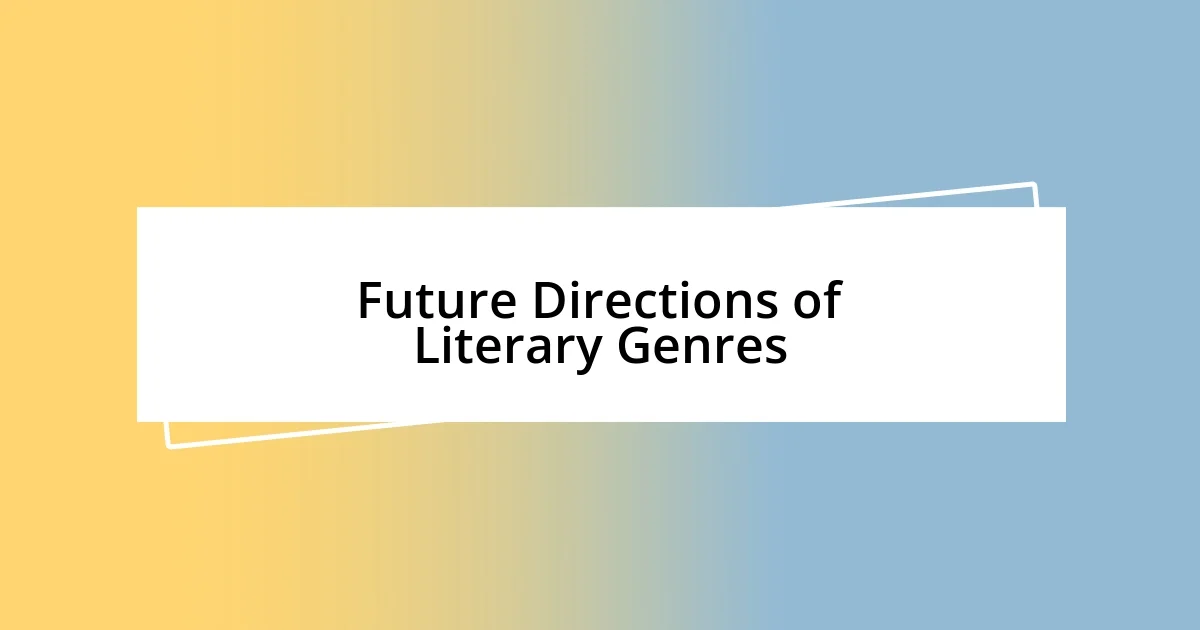
Future Directions of Literary Genres
It’s intriguing to consider how technology will shape the future of literary genres. Just imagine the possibilities with advancements like virtual reality and interactive storytelling. I recently experimented with a VR narrative that immersed me in the story, allowing me to make choices that influenced the outcome. Did that add a new layer of engagement? Absolutely! I can’t help but ponder how this might redefine authorship and reader agency in the years to come.
As genres continue to evolve, I’m particularly excited about the increased representation of marginalized voices. I’ve noticed more narratives emerging that are rooted in diverse cultural experiences, which brings fresh perspectives to the literary scene. Reading a novel by an author from a background different from mine has opened my eyes to new worldviews. Isn’t it wonderful to think about how this trend will further enrich our literary landscape and what stories we have yet to discover?
Moreover, the rise of eco-fiction is something I feel passionate about. The urgent themes surrounding climate change and environmental justice are prompting authors to craft narratives that reflect these pressing issues. I remember finishing a book that vividly illustrated the impacts of pollution on everyday lives, leaving me with a mix of hope and urgency. Will we see more genres blending with activism? I believe so. It’s exciting to think how literature can not only entertain but also inspire action in the face of global challenges.












